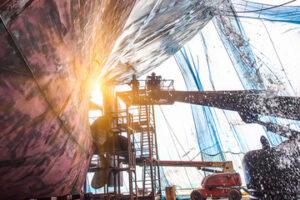Most homeowners and businesses that own waterfront property will require the services of a marine contractor at some point. This specialized field involves constructing, maintaining, and repairing structures in freshwater and marine coastal areas, including docks, cribs, piers, jetties, bulkheads, and seawalls.

Marine Contractor Near Me faces many unique exposures. Large-scale weather events and fire are just two perils that can shutter operations and sink profits.
A marine contractor is a person who has experience in the construction of structures, mainly docks, seawalls, and other maritime projects. The company is usually a business that has completed all administrative formalities to get started (business LLC and contractor licensing, heavy machinery operation certification…) and employs skilled people having the right degrees to ensure the success of the project.
All of the projects undertaken by a marine construction company require engineering expertise and high-quality materials. The company must also be able to manage the entire process, from design to performance. The company should have a track record of completing projects on time and within budget. In addition, it should be able to provide reliable estimates and quotes to help its clients make informed decisions.
It is important to hire a marine contractor that has been in business for some time and has a strong reputation. The contractor should be able to provide references and testimonials from previous customers. The contractor should have a good relationship with the local community, which will help it get the necessary permits for the job. It is also important to hire a marine contractor that has a valid license and insurance to protect its employees in the event of an accident.
The construction of a marina is a complex task. Several factors must be taken into account, including the size of the boat lift and its location. A qualified marine contractor can assist in planning and designing the structure, as well as determining how much power is required for the boat lift to operate. They can also advise the client on the best type of boat lift for their needs.
In addition to the above, a marine contractor must be able to work under challenging conditions, such as rough weather and sea depths. In order to meet these challenges, the contractor must be able to adapt quickly and comply with regulations at all levels. They must also have access to new technologies that can help them improve their efficiency and sustainability.
Maintenance
When selecting a marine contractor to build and maintain your dock, seawall or other marine structure, look for a company that has a long-term approach. A team that is focused on customer satisfaction will not abandon a project when business slows down, and they will continue to work in close collaboration with you throughout the project. This will lead to long-term relationships and a positive reputation.
A marine contractor with a focus on sustainable services will also use technological tools to help them reduce their environmental footprint. For example, they may use logistics modules like Sinay’s ETA calculator to track commercial vessel voyages and monitor the impact of their work on weather and ocean conditions.
Other key indicators of a sustainable marine contractor are how active they are in the industry and their involvement in working groups or forums. Do they regularly publish information about regulatory changes at the local, state or national level? Are they actively involved in promoting safety and higher standards?
Many marine contractors struggle to manage their finances and remain profitable during economic challenges. When this occurs, they often cut back on safety, maintenance, insurance and personnel costs until work picks up again. This can leave customers vulnerable to unexpected equipment breakdowns and other problems that could have been prevented with routine preventive maintenance.
When choosing a marine construction contractor, it is important to select one that has a strong team of leaders. Experienced and respected leaders are a sign that the company is stable, well-managed and reliable. In addition, a marine contractor that pays its invoices promptly and builds solid relationships with its vendors is more likely to be around when you need them.
Insurance
Marine contractors work on structures that are surrounded by water and marine environments, which create unique insurance requirements. The typical land-based construction contractor likely has a commercial general liability policy, but these policies exclude any work done on boats or docks. Therefore, it is important for marine contractors to have a marine general liability policy in place, as well as additional coverage specific to their needs, including pollution liability, which covers the cost of cleanup and restoration of any property damage caused by marine operations.
In addition to a marine general liability policy, many marine contractors will need an inland marine insurance policy. This type of policy covers equipment, tools and supplies that are used in the course of a project. It can also cover the loss of a contract vehicle or other mobile equipment. This policy can supplement a standard commercial property insurance policy, or it can be written on its own.
Some marine contractors will also need a commercial auto insurance policy, and workers compensation insurance is typically required for any employees working on a jobsite. In addition to these mandatory policies, marine contractors can also purchase umbrella policies for excess liability protection.
Other marine contractors will be artisan marine crafters, such as welders and carpenters who have projects to complete on vessels, ports or ship repair yards. These types of contractors often carry commercial general liability insurance, but it is important for them to talk with their insurer about obtaining a marine specialty insurance policy as well.
Finally, any marina operator will need a marina operator’s legal liability policy to protect their business from lawsuits over accidents on their premises. This type of policy also includes product and completed operations coverage, which is important to ensure that any work performed by a marina is covered for liability reasons.